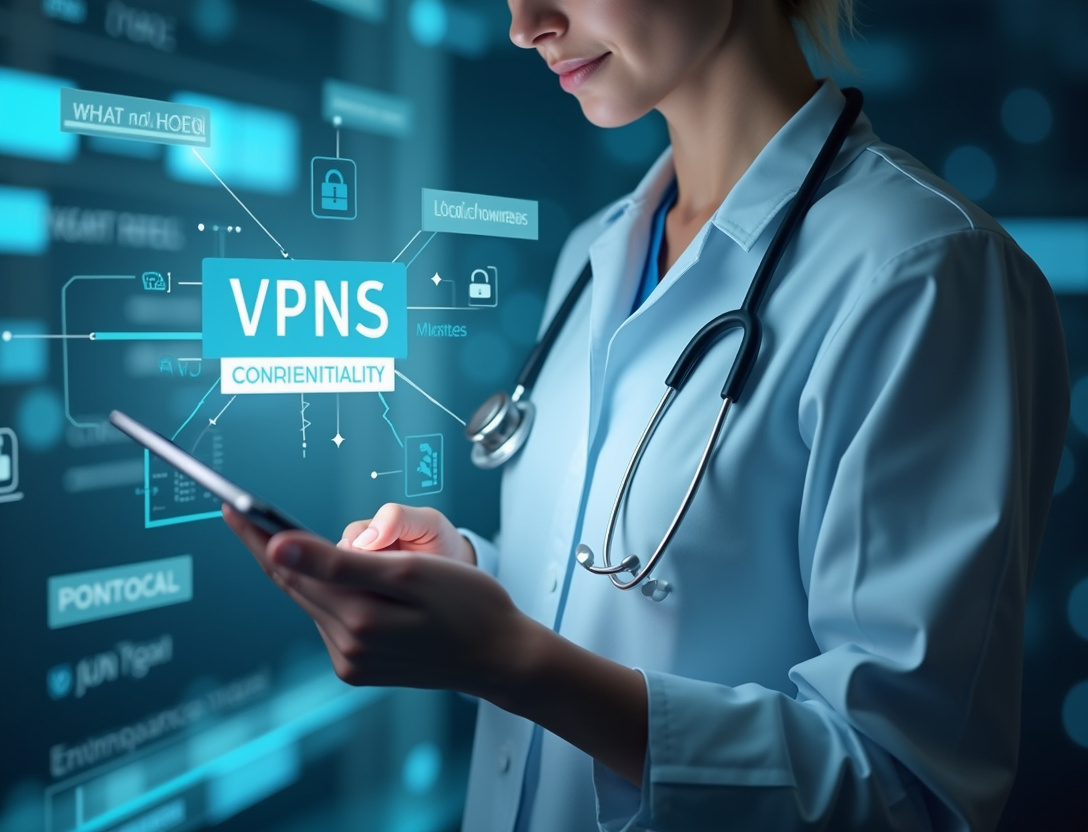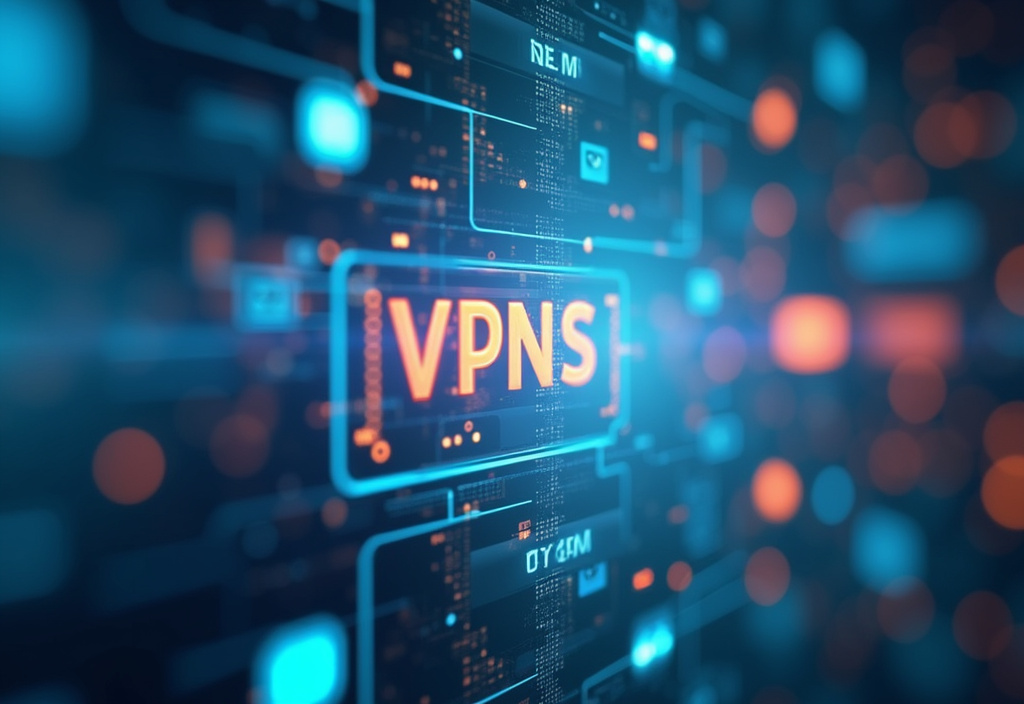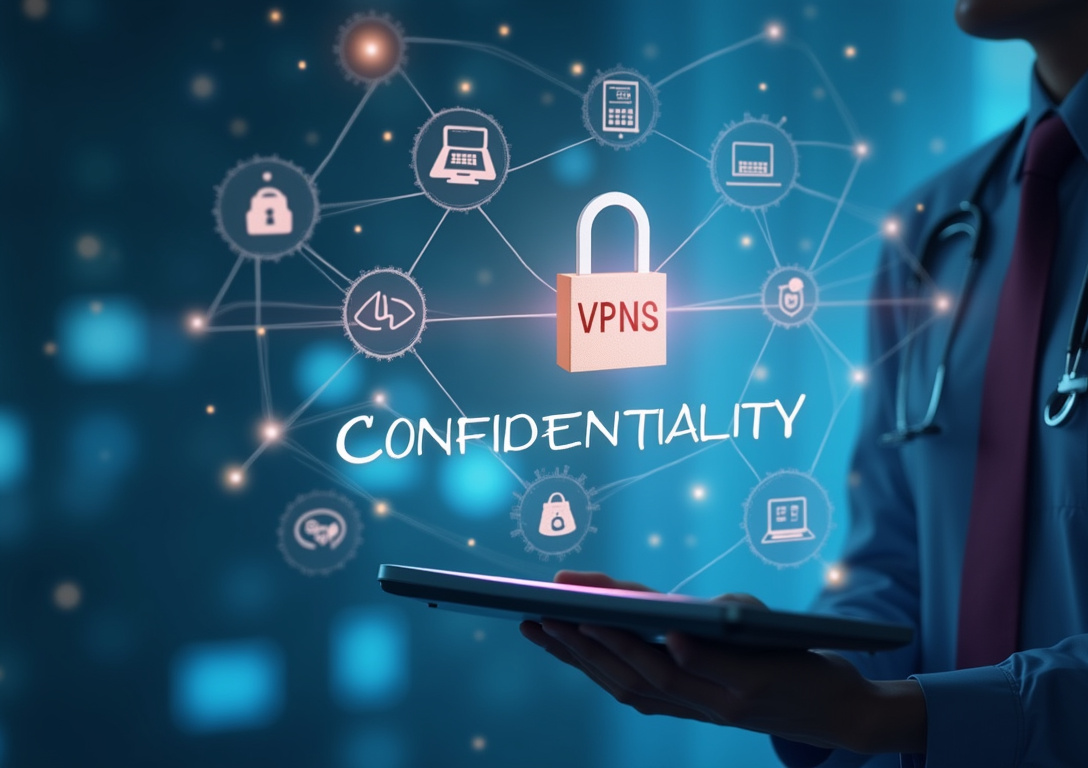VPNs for Telehealth Apps: Protecting Health Communication

Table of Contents
VPNs for Telehealth Apps: Protecting Health Communication
In the rapidly evolving landscape of healthcare, technology has become integral to service delivery, with telehealth emerging as a pivotal force, effectively extending medical access beyond traditional geographical limitations. Telehealth apps, in particular, have revolutionized the way healthcare is delivered, facilitating remote consultations, continuous patient monitoring, and personalized treatment plans. This digital transformation, while offering unprecedented convenience and efficiency, also introduces significant challenges concerning the security and privacy of sensitive medical information.
The very nature of telehealth, involving the transmission of personal health data over the internet, inevitably raises concerns about potential vulnerabilities to cyber threats. Consequently, ensuring the secure and confidential exchange of health-related information has become an imperative, demanding robust safeguards to maintain patient trust and uphold the integrity of telehealth services. Concerns regarding the potential exposure of medical records, unauthorized access to personal health information, and breaches of confidentiality are paramount.
The increasing sophistication of cyberattacks necessitates advanced security measures to protect against data breaches, identity theft, and other malicious activities that could compromise patient privacy and erode trust in telehealth platforms. It is within this context that Virtual Private Networks (VPNs) have emerged as an indispensable tool for fortifying health communication security and ensuring the protection of sensitive patient data. A VPN, at its core, provides a secure and encrypted connection over a less secure network, such as the public internet.
It acts as a protective tunnel, shielding data from prying eyes and preventing unauthorized interception or alteration. In the realm of telehealth, this translates to a secure channel for the transmission of patient information between healthcare providers, patients, and other relevant parties. By encrypting data, a VPN essentially scrambles the information, making it unreadable to anyone who does not possess the decryption key.
This encryption process ensures that even if data is intercepted, it remains indecipherable and unusable, safeguarding patient privacy and confidentiality. Furthermore, a VPN masks the user's IP address, effectively anonymizing their online activity and preventing their location or identity from being tracked. This added layer of privacy is particularly crucial in telehealth, where patients may be hesitant to share sensitive health information if they fear that their identity or location could be revealed.
In essence, a telehealth VPN serves as a virtual shield, actively mitigating cybersecurity risks, reinforcing the integrity of telehealth systems, and fostering a secure environment that encourages greater use of these services. Consequently, the deployment of VPNs in telehealth is not merely a technological consideration but a fundamental requirement for maintaining the sanctity of patient-provider communication, demonstrating a steadfast commitment to data protection and security. The establishment of secure virtual tunnels ensures the confidentiality of patient interactions and enables a reliable platform upon which healthcare professionals can deliver quality remote care.
The role of VPNs in securing telehealth apps therefore extends beyond ensuring compliance; they serve as a critical tool for maintaining trust, protecting patient data, and enabling the continued success and growth of telehealth services. As such, healthcare providers must prioritize the implementation of robust security protocols to cultivate confidence in the use of telehealth services among patients and healthcare professionals alike.
Undetermined Second section subtitle
The increasing use of telehealth apps has created a compelling demand for robust security measures to ensure the privacy and integrity of health communication security. The digital transfer of medical information opens pathways for potential breaches, making patient data protection a major matter of concern. VPNs play a pivotal role in mitigating these dangers by establishing a protected and encrypted channel for data transmission across various healthcare providers and patients.
At its core, a VPN operates as an intermediary between the user's device and the internet, masking the user's IP address and encrypting all transmitted data. This encryption transforms sensitive medical information into an unreadable format, effectively preventing unauthorized access and eavesdropping by malicious actors. In the context of telehealth, this means that patient information is shielded from cyber threats, such as hacking, interception, and data breaches.
When a patient consults with a physician through a telehealth app, the VPN ensures that the communication remains private and protected. This is particularly crucial when patients are discussing sensitive health issues or sharing personal medical information. By encrypting all data transmitted over the internet, VPNs minimize the risk of this information being exposed or exploited.
Furthermore, VPNs can help healthcare providers comply with stringent data protection regulations, such as HIPAA (Health Insurance Portability and Accountability Act) in the United States and GDPR (General Data Protection Regulation) in Europe. These regulations mandate that healthcare organizations take adequate measures to protect patient data, and VPNs offer a practical and effective solution for meeting these requirements. By employing a telehealth VPN, healthcare providers can demonstrate their commitment to patient privacy and security, fostering trust and confidence among their patients.
This trust is essential for the successful adoption and utilization of telehealth services. The implementation of VPNs in telehealth apps also enhances the overall security posture of healthcare organizations. By creating a secure network environment, VPNs minimize the chances of internal and external threats compromising patient data.
This can help healthcare providers avoid costly data breaches, legal liabilities, and reputational damage. The use of VPNs can also facilitate secure remote access to patient data for healthcare professionals who are working outside of the traditional office setting. By connecting to the organization's network through a VPN, healthcare providers can securely access patient records, lab results, and other sensitive information from any location.
This is particularly important for healthcare providers who are working from home, traveling, or providing care in remote areas. The benefits of VPNs extend beyond mere data protection; they also ensure that the communication channels are reliable and consistently available, leading to streamlined and efficient healthcare delivery. By using a VPN, healthcare providers can avoid network congestion and other performance issues that can impact the quality of telehealth services.
Additionally, VPNs can help healthcare providers bypass geographic restrictions and access telehealth services that may not be available in their region. This is particularly useful for healthcare providers who are providing care to patients in other countries or regions. Protecting sensitive health information during remote consultations is paramount.
A VPN secures these virtual interactions by encrypting data and masking IP addresses, essential for both regulatory compliance and patient trust. The secured link and stable connections enhance the effectiveness of telehealth systems. VPNs safeguard data integrity, upholding ethical responsibilities and patient-doctor confidentiality.
Consequently, VPNs fortify telehealth services against potential intrusions, creating a stable, dependable and secure platform for all users. This results in better healthcare services.
Undetermined Third section subtitle
Patient data protection is not merely a technical issue; it is a legal and ethical imperative that healthcare organizations must prioritize. The Health Insurance Portability and Accountability Act of 1996 (HIPAA) in the United States sets strict standards for protecting sensitive patient information, and similar laws exist in other countries around the world. These regulations require healthcare providers to implement appropriate security measures to prevent unauthorized access, use, or disclosure of patient data.
Failure to comply with these regulations can result in significant penalties, including fines and legal action. In addition to legal requirements, healthcare providers have an ethical obligation to protect patient privacy. Patients entrust their healthcare providers with sensitive personal information, and they have a right to expect that this information will be kept confidential.
Breaches of patient privacy can erode trust and undermine the patient-provider relationship. Implementing appropriate security measures, such as using a telehealth VPN, helps organizations demonstrate their commitment to preserving the privacy and security of patient information. VPNs play a crucial role in helping healthcare providers meet their legal and ethical obligations for patient data protection.
By encrypting all data transmitted over the internet, VPNs prevent unauthorized access to patient information. This is particularly important when healthcare providers are using telehealth apps to communicate with patients remotely. VPNs also help healthcare providers control access to patient data by requiring users to authenticate themselves before accessing the VPN.
This ensures that only authorized individuals are able to access sensitive information. Furthermore, VPNs can be configured to log all user activity, providing an audit trail that can be used to investigate security incidents. This audit trail is valuable for identifying potential security breaches and for ensuring accountability in the event of a security incident.
By implementing VPNs, healthcare providers can demonstrate their commitment to patient privacy and security, fostering trust and confidence among their patients. This trust is essential for the successful adoption and utilization of telehealth services. Furthermore, the use of VPNs can help healthcare providers avoid costly data breaches, legal liabilities, and reputational damage.
Data breaches can be extremely expensive, both in terms of direct costs (e.g., investigation, remediation, notification) and indirect costs (e.g., lost business, reputational damage). By taking proactive steps to protect patient data, healthcare providers can minimize their risk of experiencing a data breach. VPNs are an essential tool for telehealth applications providing a secure connection and therefore are a key component of IT guidelines.
The investment of reliable VPNs in telemedicine is therefore crucial. Ensuring full compliance and the avoidance of possible legal issues will be a result of the investments and implementation of a VPN in the infrastructure. This proactive approach not only safeguards patient data and preserves their confidentiality but also guarantees that the telehealth system operates within legal constraints and best practices.
This leads to increased confidence among patients and stakeholders, as they receive proper protection, while also guaranteeing their readiness and readiness to use modern healthcare technology. Implementing safeguards is not only a technical necessity but a pivotal tactic that safeguards the sanctity of healthcare interactions and encourages ongoing innovation in the ever-changing area of telemedicine. This all combines to deliver confidence, security and legal assurances for both patients and healthcare personnel.
Undetermined Fourth section subtitle
Privacy stands as a cornerstone of the patient-provider relationship, necessitating vigilant safeguarding within the digital domain of telehealth. Ensuring patients retain control over their health information and guaranteeing confidentiality during consultations are paramount concerns. Telehealth VPNs bolster privacy protocols by encrypting health communication, thereby preventing unauthorized access to sensitive data.
This encryption process transforms readable information into an indecipherable format, ensuring that even if intercepted, the data remains protected. Moreover, VPNs mask the IP addresses of both the patient and provider, adding an extra layer of anonymity and shielding their locations from potential surveillance. This is particularly important in regions where internet access may be monitored or restricted, allowing patients to seek telehealth services without fear of reprisal or discrimination.
The essence of patient privacy lies in the ability to communicate openly and honestly with healthcare providers without fear of judgment or exposure. Telehealth VPNs facilitate this by providing a secure and confidential environment where sensitive topics can be discussed freely. Whether it's a consultation about mental health, reproductive health, or any other personal matter, patients can trust that their privacy is protected, fostering a stronger and more effective therapeutic relationship.
Furthermore, a VPN can prevent third-party tracking of telehealth interactions. Many websites and online services use tracking technologies to collect data about users' browsing habits and online activities. This data can be used to create detailed profiles of individuals, which can then be sold to advertisers or other third parties.
By using a VPN, patients can prevent these tracking technologies from collecting data about their telehealth interactions, further safeguarding their privacy. VPNs also play a crucial role in protecting against man-in-the-middle attacks, where malicious actors intercept communication between two parties. By encrypting data, VPNs prevent attackers from eavesdropping on or tampering with telehealth conversations.
This is particularly important when sensitive medical information is being discussed or when healthcare providers are remotely accessing patient records. By securing health related data telehealth VPNs, provide a safe and secure communication with encryption of the data, avoiding unauthorized access to medical history and personal information. These VPNs offer a dependable way to reduce risks, keep private communication and promote trust between doctors and their patients.
Moreover, they allow patients to control how their data is managed, enhance the privacy protections and establish a safe, reliable platform for telehealth service fostering greater use and satisfaction. VPNs not only act as safety measures for data exchange but also reinforce essential ethical guidelines, giving top priority to patient privacy in the constantly changing field of remote medical service. This comprehensive method creates trustworthy patient-doctor interactions and encourages the continuous development of telehealth technologies by placing a high value on protecting personal healthcare data.
In conclusion, the integration of VPNs into telehealth apps is not merely an optional enhancement, but a critical necessity for ensuring health communication security and safeguarding patient data protection. The digital landscape of healthcare presents inherent vulnerabilities, demanding robust security protocols that prioritize patient privacy and maintain the integrity of medical information. Telehealth VPNs serve as indispensable tools in mitigating these risks, providing a secure and encrypted channel for communication, masking IP addresses for enhanced anonymity, and protecting against a range of cyber threats.
By implementing VPNs, healthcare providers can demonstrate their commitment to adhering to stringent legal and ethical standards, fostering trust and confidence among patients and stakeholders. The benefits of using telehealth VPNs extend beyond mere compliance; they contribute to the overall efficiency and effectiveness of telehealth services. By providing a secure and reliable platform for communication, VPNs enable healthcare providers to deliver quality care remotely, without compromising patient privacy or data security.
This is particularly crucial in sensitive areas such as mental health, reproductive health, and chronic disease management, where patients may be hesitant to seek telehealth services if they fear their privacy could be compromised. Moreover, the use of VPNs can help healthcare providers expand their reach and serve patients in remote or underserved areas, where access to traditional medical care may be limited. By breaking down geographical barriers and ensuring secure communication, telehealth VPNs can improve healthcare access and outcomes for a broader range of patients.
The selection and implementation of a telehealth VPN should be carefully considered, taking into account factors such as encryption strength, server locations, logging policies, and compliance with relevant regulations. It is essential to choose a reputable VPN provider with a proven track record of security and privacy. Ultimately, the success of telehealth initiatives hinges on the ability to create a secure and trustworthy environment where patients feel comfortable sharing sensitive health information.
Prioritizing patient data protection is not only a legal and ethical obligation but also a strategic imperative for ensuring the long-term viability and growth of telehealth services. Securing communication through VPNs is crucial to telehealth success, and protects both patients and healthcare providers. Patients can trust that there information is protected, giving them peace of mind during communication.
The ethical and safe handling of patient health records ensures a sustained trusted relationship. By implementing these safeguards, it enhances the quality and wide adoption of telehealth services, and ensures long term growth of telehealth platforms. As telehealth continues to evolve, VPNs will remain an essential component of the security infrastructure.
Healthcare organizations must stay informed about emerging threats and adapt their security measures accordingly, to ensure that patient data remains protected in an ever-changing digital landscape. By prioritizing health communication security and patient data protection, we can unlock the full potential of telehealth to improve healthcare access and outcomes for all and ensure that benefits of these new advances are available to all.
Stay Updated
Get the latest VPN news, tips, and exclusive deals to your inbox.




